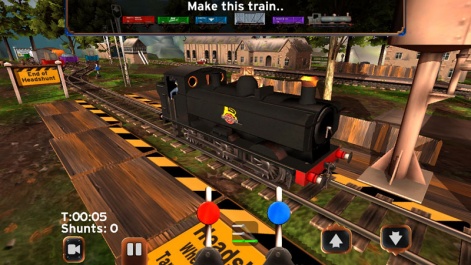Fewer and fewer developers from the early days of the iPhone remain active.
But one such is UK indie Strange Flavour.
Working with US publisher Freeverse, it put out some of the then most successful iPhone games, notably the 99c Flick Fishing, which sold millions of copies.
Since then it's experimented with free-to-play games, including its novel 'Play Nice' initiative, which capped the amount of IAPs players would spend to unlock all the content in their games.
However, with latest release Tiny TrackZ, Strange Flavour has reverted to its original paid game model.
We asked co-founder Aaron Fothergill to explain more.
PocketGamer.biz: Given your history spanning iPhone games, how easy/difficult do you think it is for small indies to make a sustainable business in mobile games at the moment?
Aaron Fothergill: It's bloody hard now. The biggest issue is visibility, especially when you've got no budget for ads (and in-game ad pricing is sky high because the big F2P players are throwing money at buying players).
Players expect all games to be free but don't want to see ads or the word IAP anywhere and they've grown to expect triple-A level production and content size for that.
Players expect all games to be free but don't want to see ads or the word IAP anywhere.Aaron Fothergill
We're really struggling (essentially we're still living on our savings from Flick Fishing while we try and score a new indie hit that might pay the rent).
I'm partly to blame as I was one of the first people that suggested the idea putting our game out at 99c to grab chart position and players with Flick Fishing. It worked then, but we're all paying for it now.
You've done some F2P games. How did you find the experience?
The first one we did was the free version of Flick Fishing that we did when publishing with Freeverse. There we had the advantage that ngmoco were able to push it to their email list of players as well as the couple of million Flick Fishing players that had the paid version.
So it grabbed 10 million+ downloads and made more money than the paid version, even though they were both available (and the paid version had exactly the same content for 99c and Flick Fishing Free wasn't designed as a typical F2P farming game.
That, of course, was before the really big F2P accountants kicked in and the market's changed ever since.
With your Play Nice system, you limited the amount players could spend on IAPs. What was the player reaction to this, and what were the commercial results?
It got us some good press and lots of players thanking us for doing it - made very little money though. The pirates probably made more money off it than we did with their Google ads on their sites giving away (or even selling!) hacks to get the max IAP level without buying it through the game.

It also involved a lot of extra code and testing to get right (and extra explaining to some Apple approval reviewers who didn't understand why they couldn't see all the IAP in game that was listed) and could confuse players.
Do you think micro-transactions are incompatible with the type of games you want to make?
No, as long as we can make enough micro transactions. Currently the only thing incompatible with the games most devs want to make is the player's 'entitlement' to get it all for free.
Whether that's expecting every game to be free on the App Store or thinking it's ok to grab hacked versions for free via pirate sites.
(Cue the usual "ah but pirates wouldn't have bought it anyway" argument.
We wanted to go back to writing games where we could focus more on the actual game itself without the payment system affecting how the gameplay worked.Aaron Fothergill
They wouldn't but most persuade their friends not to buy software too. If just 10% of the people that steal our games bought them, or even some of those who downloaded pirated *FREE* games actually got them from the App Store, our chart position would be enough to make our games visible and we'd possibly make a living. We'd certainly double our sales).
With Tiny TrackZ, you've back to the early days with a paid game. Why did you decide to return to this model and why do you think $2.99 is a good price?
As I mentioned above, Play Nice was and is a good system for us and players if you want to do an F2P-based game. It's fair and while awkward to implement (and sometimes to explain) it works well if you can get enough players.
However it is still an F2P system so relies on huge numbers of downloads to be worthwhile. It also steers game design a little (as good F2P always does).
So we wanted to go back to writing games where we could focus more on the actual game itself without the payment system affecting how the gameplay worked. Plus for the smaller sort of numbers we were seeing, it looks like paid is our only real option to make a living.
In a small way, it's also a good anti-piracy move as to pirate a paid game on the App Store, you generally have to use a jailbroken phone, which limits it a little. For F2P games, there's a lot more methods that don't require hacking your phone and most of the players we were seeing playing games like Any Landing for the last couple of years appeared to be doing so with lots of IAP-based content, but from countries that we've not seen sales from.
We just want to write great games, keep expanding them and not be looking at spreadsheets and server reports every day to determine what to change in them.
You can buy Tiny TrackZ from the App Store here






















